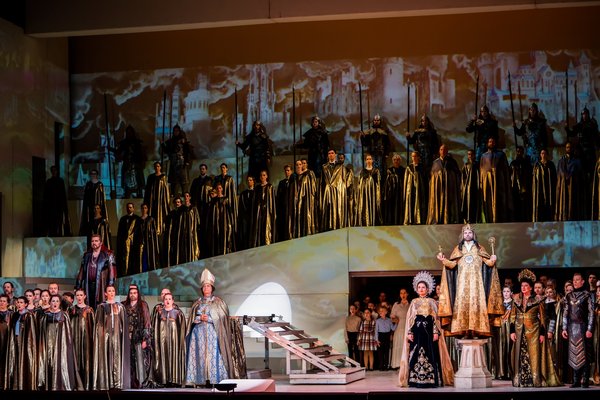István, the son of Grand Prince Géza, and the Bavarian princess Gizella are married. The people pray for the couple. In the festive atmosphere, the three Hungarian lords Bese, Solt, and Sur are already fantasising about their future successes. Réka, the Christian daughter of Duke Koppány, is praying, asking for the conversion of the pagans, when she is interrupted by one of her father’s pagan men, Laborc, who rejects the new God. After the death of Géza, Koppány and István have a falling out at the funeral: Koppány had been hoping, to no avail, that Géza’s death would absolve the former promise of István inheriting the throne.
The people ask for the peace of God, after which István and his mother Sarolt are entertained by folk musicians, which István finds to be overly old-fashioned. That’s when Laborc arrives at the scene. As a messenger from Koppány, he asks Sarolt to continue the ancient tradition of marrying him so they could rule together. Sarolt rejects the proposal and has Laborc executed. The three profit-seeking lords again show up, this time taking István’s side. However, he does not fall for their worthless flattery. After Sur, Solt, and Bese leave, István gives voice to his doubts, but Sarolt fills him with hope. Others are also dissatisfied: Gizella wants more from István as a husband, and the knight Vecellin wants more from him as a military leader. Asztrik, the head of the missionaries, appoints István Grand Prince.
Duke Koppány and his shaman Torda address Koppány’s followers. His admirers Boglárka, Enikő, and Picúr try to woo him, but the Duke resists. The three turncoat gentlemen arrive with the news that István has been appointed Grand Prince. They are now trying their luck by siding with Koppány, but he does not support them, either. Torda makes the most of the tension in the air, kindling the fire of the Duke’s belligerence and proceeding to make a sacrifice to the ancient gods. Réka tells her father about a nightmare she had, where she saw him quartered as a traitor. However, Koppány sees no solution than to take up the fight. István now arrives on scene and offers to hand over his power to Koppány on condition he turns to Rome, but Koppány does not accept the throne. Torda arrives with a bloody sword and a call to arms. In the battle, Koppány suffers a humiliating defeat.
Women, elders, and children mourn the victims of the battle, the fight between two siblings. The victorious army celebrates István when Réka arrives to ask for her father’s body so she may bury him. István would be happy to fulfil the girl’s request, but Sarolt opposes her, and issues her command: “Quarter his body!” Koppány’s body is cut in four, and the people praise István. The Abbot Asztrik crowns István in the name of God, using the crown provided by the pope.

